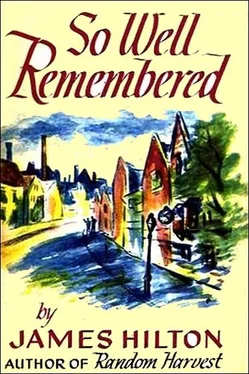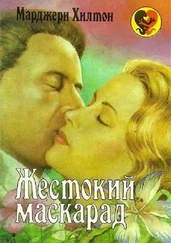Джеймс Хилтон - So Well Remembered
Здесь есть возможность читать онлайн «Джеймс Хилтон - So Well Remembered» весь текст электронной книги совершенно бесплатно (целиком полную версию без сокращений). В некоторых случаях можно слушать аудио, скачать через торрент в формате fb2 и присутствует краткое содержание. Год выпуска: 1945, Жанр: Проза, на английском языке. Описание произведения, (предисловие) а так же отзывы посетителей доступны на портале библиотеки ЛибКат.
- Название:So Well Remembered
- Автор:
- Жанр:
- Год:1945
- ISBN:нет данных
- Рейтинг книги:5 / 5. Голосов: 1
-
Избранное:Добавить в избранное
- Отзывы:
-
Ваша оценка:
- 100
- 1
- 2
- 3
- 4
- 5
So Well Remembered: краткое содержание, описание и аннотация
Предлагаем к чтению аннотацию, описание, краткое содержание или предисловие (зависит от того, что написал сам автор книги «So Well Remembered»). Если вы не нашли необходимую информацию о книге — напишите в комментариях, мы постараемся отыскать её.
So Well Remembered — читать онлайн бесплатно полную книгу (весь текст) целиком
Ниже представлен текст книги, разбитый по страницам. Система сохранения места последней прочитанной страницы, позволяет с удобством читать онлайн бесплатно книгу «So Well Remembered», без необходимости каждый раз заново искать на чём Вы остановились. Поставьте закладку, и сможете в любой момент перейти на страницу, на которой закончили чтение.
Интервал:
Закладка:
So he asked, forgetting to care whether any of those present knew anything of his own personal affairs: “I noticed a name on my way here… a patient in one of the private rooms… Winslow…”
“Winslow?”
“Aye, Winslow.”
Someone said: “Oh yes… rather badly smashed up, poor chap. You know him?”
“Er—no… But I… I know OF him—that is, if he belongs to the same family. Is he—er—related to LORD Winslow?”
The head surgeon thought he might be. Somebody else said he was. The head surgeon then said: “You can see him if you want. He’s not TOO bad.”
“Oh no, no—I wasn’t thinking of that.”
But afterwards, while he was trying to talk about something else altogether, George wondered if he HAD been thinking of that. For the idea, once in his head, engaged those sympathies of his that were always eager for a quixotic gesture. Years before, he had come near to hating the man who had taken Livia from him—hating him BECAUSE as well as IN SPITE OF the generosity with which he, George, had treated them both. But now there was no hate or near- hate left, but only a wry curiosity, plus the warmth George felt for any man broken by the war. Would it not be worth while to clinch this attitude by a few words of well-wishing? Could it possibly do any harm? Might it not, if it had any effect at all, do good?
When he was about to leave he said that perhaps he would visit that fellow Winslow after all.
“Certainly… Briggs here will take you over.” The head surgeon singled out a young colleague who responded with respectful alacrity. “Don’t stay too long, though.”
“Oh no, only a few minutes. Not even that if you think it might—”
The surgeon smiled. “It won’t. You’re too modest, Boswell.” But he added quietly to Briggs: “Better go in first, though, and see how he is.”
As George accompanied the younger man across lawns and courtyards to the block in which Winslow’s room was situated, they discussed the weather, the big raid on Mulcaster (history by now), the widening circle of war all over the world, and the difficulties of obtaining whisky and cigarettes that had lately become so acute that George had begun to feel almost ashamed of his own total exemption from such common hardships. But they provided a theme for conversation, and only when Briggs left him in the corridor did his thoughts recur to the nearer urgency, and then with a certain qualm. Was he doing a wise or a foolish thing, or merely an unnecessary one? While he was still wondering, Briggs emerged, his face youthfully flushed as he stammered: “I’m afraid, sir, he—I mean, if you could perhaps come round again some other time—”
“Why, of course… Not convenient, is that it?”
“That’s it.” But the assent to such a vague explanation was so eager that George went on: “Is he asleep? Or isn’t he feeling good?”
“No… he’s no worse… and he’s not asleep…”
“Then what?”
“Well, sir, to be frank, he—he said he—er—he’d rather not—er—”
“Didn’t want to see me, eh? Well, that’s all right. Don’t bother about it.”
“It’s a mood they get into sometimes. They feel so low they just don’t feel like having visitors at all.”
George said he perfectly understood, and then, to cover an embarrassment that was more the young doctor’s than his own, added: “I’m glad it isn’t because he’s worse.”
“No… he’s getting on as well as can be expected.”
They walked away together, again discussing topics of general interest. At the hospital gate George said: “You did give him my name, I suppose?”
“Oh yes. I also said you were the Mayor of Browdley, but— but—”
“But it made no difference, eh? Well, why should it?”
George laughed, and then they both went on laughing as they shook hands.
But by the time he reached Browdley he could not see much of a joke in the situation, nor did he feel his usual zest for tackling the pile of clerical work on his desk. So he walked across the town to St. Patrick’s clergy-house. Wendover was in, and George, on impulse, told him all about his visit to the hospital and his discovery of Winslow there. This led to a longer talk about Livia than George had had for years with anyone, and also to a franker expression of Wendover’s personal attitudes than George had yet encountered, despite his many years of close friendship with the priest.
“You see, George, I never felt it my duty to discuss your affairs— especially as you never told me much about them.”
“Aye, I never felt like it—which is no reflection on you, of course. And I wouldn’t say you’ve missed much. I’ll bet you find it hard listening to stuff about other people’s private lives.”
“Even if I did, it would still be part of my job. Another part is to offer advice.”
“And that’s even harder, I should think.”
“Well, you know, a priest has one advantage—so many things are decided for him by authority. Take divorce, for instance. The view of my Church is very simple—we think it’s wrong, and therefore we’re against it.”
“Aye, I know. And that makes me guilty of compounding a felony because I made it as easy as I could for the two of them? Isn’t that how you’d look at it—and at me?”
Wendover gazed at George very steadily for a moment before saying: “Do you really want my opinion of you?”
“Mightn’t be a bad moment to get it out of you.”
“All right. I have it ready. Nothing new, either—I’ve had it for years. I think you’re much more like a Christian than many people who come to my church.”
“Quite a compliment.”
“Less than you think.”
It certainly failed to please George as most compliments did; indeed, for some reason it made him feel uncomfortable. He said, almost truculently, after a pause: “I’d do the same again if I had to. You can’t hold a woman if she’d rather be with someone else. And anyway, twenty-odd years is a long time to go on bearing a grudge. That’s what puzzles me—why should HE bear a grudge?… Well, maybe I can guess. I can remember a few things Livia once told him.”
“About what?”
“About ME.”
“Do you mean AGAINST you?”
George nodded.
“Why should you think that possible?”
And then, for the first time, after an almost quarter-century interval, George disclosed to another human being the events of that memorable day, September the First, 1921—the day of the foundation-stone-laying at which Lord Winslow had officiated, and after which the two had had their long conversation in George’s study.
When he had finished Wendover made no reply at first, though he did not seem particularly surprised. And George, with his usual revulsion of feeling in favour of someone he had lately been criticizing, hastened to continue: “Mind you, don’t get too bad an impression. If I’ve given you that, then—”
“No, George—and I don’t rely on impressions. You’ve only told me that she lied, and that she may have been unfaithful while she was still legally your wife—”
“Aye, it sounds bad enough. But the funny thing is, she had her good points.”
“It would be very funny indeed if she hadn’t.”
George caught the note in the other’s voice. “I know—you probably think I don’t blame her enough. But after all, she was MY choice—and when she was only nineteen, don’t forget. Might have been my own fault for not making HER happy too. Maybe she’s been really happy with this other chap. I’ve nothing against either of ‘em. And if he’s ill or crippled, if there were anything I could do—though I don’t suppose there is… Well, I took the first step today and got snubbed for it, and that’s about the whole story. So with all this off my chest, I’ll now go home and try to work.”
Читать дальшеИнтервал:
Закладка:
Похожие книги на «So Well Remembered»
Представляем Вашему вниманию похожие книги на «So Well Remembered» списком для выбора. Мы отобрали схожую по названию и смыслу литературу в надежде предоставить читателям больше вариантов отыскать новые, интересные, ещё непрочитанные произведения.
Обсуждение, отзывы о книге «So Well Remembered» и просто собственные мнения читателей. Оставьте ваши комментарии, напишите, что Вы думаете о произведении, его смысле или главных героях. Укажите что конкретно понравилось, а что нет, и почему Вы так считаете.










